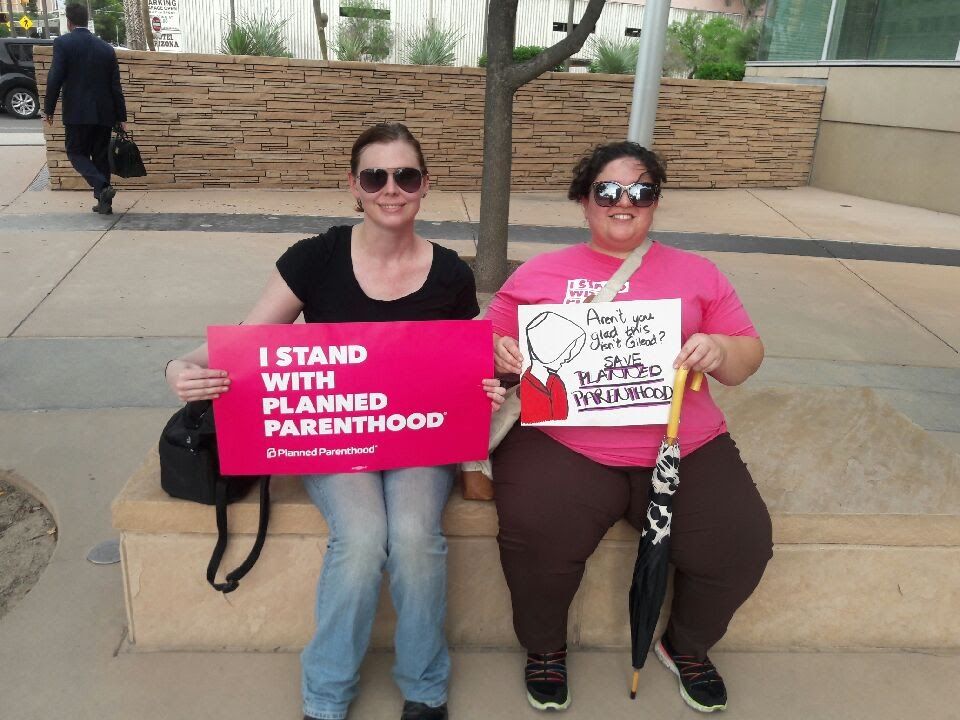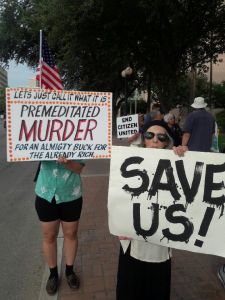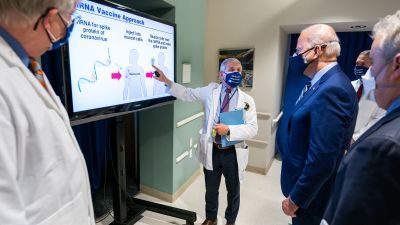
Health care protest in Tucson, Arizona, outside Sen. John McCain's office on July 26, 2017. (Photo by Laura Klinkhammer)
This Q&A is part of Sarah Jaffe’s series Interviews for Resistance, in which she speaks with organizers, troublemakers and thinkers who are doing the hard work of fighting back against America’s corporate and political powers. This interview has been edited for length and clarity.
Pundits seem to agree that John McCain gave one of the greatest speeches of his life when he returned to the Senate chamber to vote on health care repeal. But where it all seems to go awry is his subsequent vote for the very type of health care bill that he denounced in such ringing terms. It took no time at all for comparisons to spring up between McCain’s situation and that of Ted Kennedy, who famously refused to be sidelined by his brain tumor to make sure that his vote for Obamacare was recorded. Now McCain, who some politics watchers considered a voice of moderation in his party, has raised the ire of the activist community. Sarah Jaffe spoke with two people taking it to the streets — specifically to those outside McCain’s offices: Anastasia Bacigalupo in Washington, DC and Lauren Klinkhammer in Tucson, Arizona.
Bacigalupo is a member of ADAPT, a national grass-roots community that organizes disability rights activists to engage in nonviolent direct action, and the executive director for Westside Center for Independent Living in Los Angeles.
Sarah Jaffe: We are talking Wednesday evening, as you just got back from the police station in Washington, DC after paying your fine for having been arrested. Tell us about that.
Anastasia Bacigalupo: Right now in the disability rights movement — we are fighting for the lives of our sisters and brothers and ourselves — to maintain the Affordable Care Act as it is currently. The fight is getting really real, for lack of a better word. We were at a protest yesterday in the atrium of the Hart Building, trying to send a message to senators that any repeal is unacceptable.
SJ: As of Wednesday, the Senate has voted to proceed on debate, but has voted down the bills that came up for debate. Where does it look like the Senate is going next?
AB: The Senate has put itself in this really awkward position with trying to force this debate. Now they can’t garner the support, thanks to all the protests across the country. The whole reason that they had to have a whole session last night, the reason why they are still trying to push something forward this week, is because of the impact of protests that my colleagues and myself have been participating in nationwide. I think the message is getting across.
I think what is going to end up happening is they are going to try to do some modified changes. I don’t know how much [Texas Republican] Sen. Ted Cruz’s watered-down version is getting traction, but so far there is some focus on a stripped-down, low-cost insurance plan making carriers also provide coverage that complies with the federal standards.
SJ: Tell us about what the plans are for the next couple of days.
AB: Today [July 26] is the anniversary of the Americans with Disabilities Act. What we are reflecting on how the composition of Congress is so different. There is only so much we can do here in DC. People are being told to go back to the handful of crucial states. I, myself, am a resident of California, but I felt called to service to protest in Arizona and I spent quality time in [Arizona Republican] Sen. Jeff Flake’s office a few weeks ago.
The effort is to educate the communities of those senators to make sure it really resonates with them that this handful of individuals are making decisions that will have incredibly negative implications on the lives of many people. Supports will fall away like a house of cards if these senators are not educated and don’t understand the gravity of what is before them.
SJ: Since you have been in Arizona, I can’t talk about this without talking about John McCain making his triumphant return to vote against health care for people.
AB: I can’t speak for the entire disability rights community, but there was a hope, a feeling, that he was going to come back and vote against it. There is a feeling of betrayal in that he is a person with a disability, and to a certain extent, we expect him to represent people with disabilities. I can’t explain his vote. I know he has, in the past, been a supporter. I have heard some grumblings here and there that people thought his vote was intentional to force the debate.
Yesterday, while we were being detained by Capitol Police, Sen. Tammy Duckworth (D-IL) came down. She is a person with a disability who serves our country — first in the military, now as a member of Congress. I think that really what has to happen is Democrats in Congress have to really work together, band together.
— Anastasia Bacigalupo
SJ: What can people do, particularly if the call right now is for people to go back to the states?
AB: That is a great question. If you live in a state where your senator is voting against the Affordable Care Act, now is the time to acquaint yourself with that senator. I would recommend showing up to every single event that senator has in the community. They have an open house, they cut a ribbon, they smash a bottle over a boat — whatever they are doing, show up. Show up with signs. Request to meet with the senator. Not everybody is comfortable with getting arrested, and that is okay. You don’t have to get arrested to be a voice, to share your story.
Our blessing, being Californians, is that Sen. [Kamala] Harris and Sen. [Dianne] Feinstein are champions of disability rights and the disability community. We have a lucky circumstance, but even for us, we have friends, we have relatives in those states. You should be reaching out to those friends and relatives. Heck, it is summertime; take a trip and visit them. Talk to them about how to be active civically. Talk to them about how to talk about these issues.
The worst thing is thinking that these elected officials are in ivory towers. They got elected by your votes. They got elected by your friends’ votes, by your family members’ votes. Those votes are important. I would say that if you live in a state where your senator has voted the wrong way, you need to start engaging. If you can’t make it because of your circumstance, if you can’t get to those events, you can send a letter every day. You can send a postcard every day. You can send emails. If you have an iPhone, you can record yourself speaking and send it as an attachment. There are so many things people can do.
Anastasia Bacigalupo remains in Washington, DC; meanwhile, in Arizona Wednesday night, Sarah Jaffe spoke with Lauren Klinkhammer at an impromptu rally outside of Sen. John McCain’s office in Tucson.
Sarah Jaffe: Tell us how this rally came together. You were saying before that it is not common for there to be 150 people on the street in Tucson in the evening.
Lauren Klinkhammer: No. We are a small town and it is sprawling out in Arizona. We don’t have a lot of city centers. So this is a surprise. I am really impressed that this many people came out. It is touching, because even though the crowd is full of people that are not wanting the ACA repealed, they have American flags. They have these signs that are saying, “Repeal. Don’t die.” Serious messages, but with American flags. It is that combination of speaking out and jumping up that is very American.
— Lauren Klinkhammer
SJ: Do you think it was the particulars of Sen. McCain’s situation, coming back while he is fighting cancer, that is drawing people out like this tonight?
LK: I guess it just depends on what your point of view is. Some people are angry that he has done this. Some people feel like, “How could he vote for the motion to go forward, when he himself is dealing with health care issues?” Some people see it as an opening to the discussion. It just depends. People are trying to be respectful and to give him a chance.
Almost everyone I talk to really is not for repealing Obamacare. They want it fixed. They don’t want it repealed. They want the funds put back in. They want to keep the pre-existing conditions and all of the little clauses. They don’t want to lose that. There are a lot of things within that bill that before this were grey areas that were missed and ignored before that’s why it took them a long time to write it.
I just met with a staffer at McCain’s office. I said: “You know what, if you guys are going to be doing this “Vote-A-Rama,” I am a disabled person. I have been middle class. I want to be available to your researcher or whoever it is that advises McCain so that when they have nuances of this bill popping up, that before he votes,” I went with a local group called LUCHA and Planned Parenthood and I went individually, as well. I haven’t gotten in to meet with the governor. I haven’t been able to get to have an appointment with Sen. Flake’s office. They did take some of my notes, but it takes some time.
SJ: Tell us about your story. How did you get involved in this fight? You said you had been to DC.
LK: You are going to laugh, because just three weeks ago, I was having a day where I was feeling better and someone from my doctor’s office was going to an event put on by 10 different organizations in Arizona. They had a van going up to Phoenix. I said, “Why not? I will go.” A lot of times I can’t. On the way up, they said, “How would you like to go to DC?” and I said, “Sure. I will go.” So, I took time off and then I went.
— Lauren Klinkhammer
I am suddenly in DC and the next thing I know, I am among about 150 people that are doing civil disobedience in kind of the way that Martin Luther King did. Health care workers, sick people, brothers and sisters of people that will die if this bill passes, willing to be arrested so that our governors and our senators and our representatives could realize that if a nurse practitioner or a Harvard student or a patient dying of AIDS is willing to be arrested for the first time in their life for the good of humanity, maybe it is important enough to listen.
I felt bad asking my work again for the third week in a row, “Could you please let me have off again so I can go up to DC last minute and be around these radicals?” But, hey, you know what? It is to help them. Honestly, regardless of their party, my co-workers, my friends, random people have been supporting me. People have been buying me ice cream. People have been just super supportive. You know what else? They have been Republican, independent, Green Party, Libertarian. This is not a popular bill. This is everybody. I have had a lot of support locally and Arizona is a very conservative place.

Health care protest in Tucson, Arizona, outside Sen. John Mcain’s office. July 26, 2017. (Photo by Laura Klinkhammer)
On the 31st, there are going to be lots of groups of people in DC congregating and protesting this and we need people. We need people from all 50 states to go — especially certain states, like Virginia, Arkansas, Ohio, Colorado, Nevada, Arizona, Alaska — states where their senators have been moderate. We really need them to continue calling their senator and we need people to caravan out to DC, literally, before Monday, and we need them to go out there and we need them to participate and we need them to pull a Martin Luther King and stand up.
We need people in the religious community. We need people who are celebrities, people who have influence. We need to have people that are entrepreneurs. You get my drift. We need people to go to Washington. Get in your car, get in your plane, get in your bus, go put your thumb out and go out there. Put your money toward it, too. Volunteer. Go to the local rallies. Pick up your telephone and call all of your senators. Call senators from other states.
This is not the time to sit back and say, “it is not going to happen,” because it is. Motion to continue? Nobody predicted it would happen. Nobody thought McCain was going to fly out there. He went out there. This is not the time to sit back. Health care is at risk. People’s health is the most important thing in your life. Money doesn’t die with you. You die. We need health care. Whatever people can do, they need to do the maximum and they need to do it yesterday.
Interviews for Resistance is a project of Sarah Jaffe, with assistance from Laura Feuillebois and support from the Nation Institute. It is also available as a podcast on iTunes. Not to be reprinted without permission.




